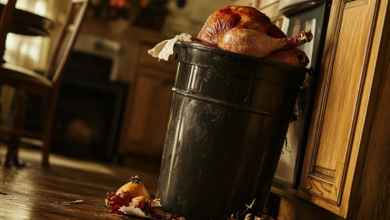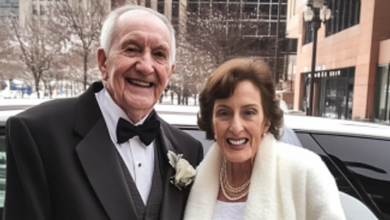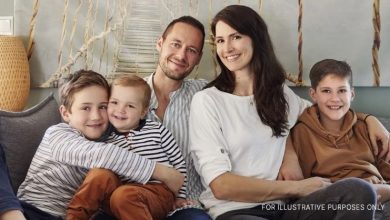Some people remember childhood as golden summers and bedtime stories, dinners around the table and bicycles left in driveways. Mine didn’t look like that—not until Grandma Grace arrived and rewrote everything.

My mother, Delia, was always chasing bad men and worse decisions. My sister, Cynthia, followed suit, all sharp eyeliner and sharper words. And me? I was the quiet one. A shadow in the chaos. A child born into noise but made of silence.
Then one day, when I was six, Grandma Grace showed up, packed a small bag with my things, and said simply, “You’re coming home with me, Tom.”
And I did. Because home wasn’t a place—it was her.
She wrote notes in my lunchbox, came to every school performance, even when I forgot my lines or played a tree in the background. She sold her favorite vintage necklace to help buy my college textbooks. She never raised her voice, but when she spoke, people listened.
When she died, I was twenty-six. But in that moment, I felt six again—small, lost, and suddenly unmoored.
At the funeral, I sobbed. Cynthia wore high-end black and fake tears. Delia cried loudest—when someone was watching.
Then came the will.
The lawyer’s office smelled of dust and waiting. Delia sat straight, already imagining renovations to a house she hadn’t inherited yet. Cynthia scrolled through her phone with indifference. I just sat still, hoping the door might open and Grandma Grace would walk in like it had all been a mistake.
The lawyer began to read.
Delia got the house.
Cynthia got the car.
And I… got an envelope.
It held a photo—me and Grace at the zoo, when I was eight. I was grinning. She was mid-laugh. Giraffes behind us. Attached was a handwritten note:
“For you, Tom. Our photo in a frame. Love you forever, sweet boy. — Grandma G.”
Delia scoffed. Cynthia chuckled.
I said nothing. Just walked out with the envelope clutched like a lifeline, like it could explain something the rest of that room never could.
The next morning, I went to the house. Delia was shouting at movers, claiming every dish and dustpan. I ignored her, walked past the noise, and found the photo on the hallway wall. I took it down.
“Sentimental trash,” Delia sneered. “You were always too soft.”
She had no idea. But she would.
At home, I stared at the frame. It was chipped, weathered—unworthy of the memory it held. I remembered the beautiful walnut frame my coworker Marla had given me. “For something that matters,” she’d said.
As I opened the old frame to transfer the photo, I felt something tucked behind the backing. An envelope, sealed and taped in place.
Inside were stock certificates, bank statements, a key, and a single handwritten line:
“Real treasure isn’t loud. Love, Grandma G.”
No tears came. Not yet. I wasn’t ready.
The next day, I walked into my job and resigned. No farewell speech. No office cake. I visited the bank.
Inside the safety deposit box was more than I ever dreamed: five fully paid-off rental properties in my name, shares in a shipping company, and one deed.
To the land beneath Delia’s house.
Grandma Grace hadn’t played checkers. She’d played chess.
When I told Delia, she exploded.
“You can’t do this!”
“I own the land,” I said. “You can’t sell it. I’m your landlord now.”
“She always favored you!”
“No. She raised me. You left.”
Click.
Cynthia didn’t do much better. The car she’d inherited was worthless, buried under unpaid taxes. Her boyfriend, Rhett, the compulsive gambler, had disappeared—along with what little she had left.
Still, I helped. I bought the house from Delia at a fair price. No drama. No revenge.
Not for her—for Grace.
But I didn’t move in.
Instead, I partnered with Omar, a contractor with kind eyes and steady hands. We renovated every room, leaving little pieces of Grace intact—the crooked stair, the pantry’s green glass, the chipped floral tiles she once called “charming.”
We turned it into Grace’s Corner.
A soup kitchen. A reading nook. A sanctuary for anyone who needed warmth. We served her pies, her tuna melts, her peppermint tea. That photo of us at the zoo? It hung by the door.
And people came. People who were hungry. People who were tired. Kids who needed a story. Mothers who needed five minutes of peace.
On Thursdays, we offered free haircuts in the backyard. Dani, an old high school friend, volunteered. She said Grace’s house had a soul. She was right.
One morning, Cynthia showed up. She looked smaller, shaken.
“I need help,” she said. “Rhett’s gone. I have nothing.”
“No money,” I told her. “But you can stay. Work. Build something. Become someone Grace would’ve been proud of.”
She hesitated. “I don’t know how.”
“That’s okay,” I said. “Neither did I. Grace taught me.”
She blinked back tears and nodded. As I turned to head inside, I heard the door click closed behind her.
Not slammed.
Not shut in anger or pride.
Just gently closed.
Like someone finally stepping in.
This work is inspired by real events and people, but it has been fictionalized for creative purposes. Names, characters, and details have been changed to protect privacy and enhance the narrative. Any resemblance to actual persons, living or dead, or actual events is purely coincidental and not intended by the author.






